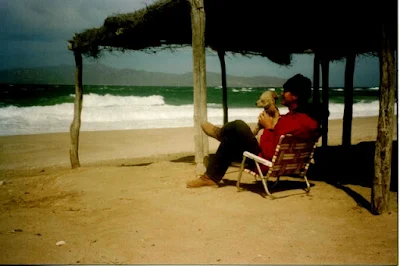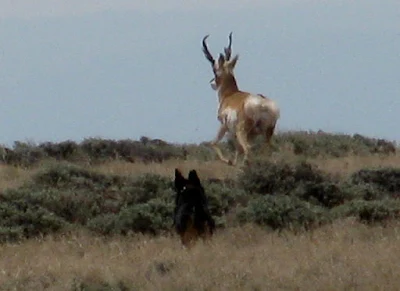Why does it always sound like such a left-handed compliment to call something or somebody, "Old Reliable?"
Once upon a time I read everything I could get my hands on about the War Between the States. When they said that Robert E. Lee called General Longstreet his "old warhorse," I felt sorry for Longstreet and felt envious of the reckless flash of Stonewall Jackson. Likewise, how would you like to be the minivan in the garage that gets call "old reliable?" (Next to it sits a useless and pampered sports car that only gets used on Sunday afternoons when the weather is good.) Would a wife's ego be flattered if her husband thought of her as "Old Reliable?"
The term is actually a serious compliment, and its user would quickly wise up if Old Reliable were taken away. Thus I always feel a little guilty when thinking of walking/hiking as a "mere" backup sport for what I really want to do.
_____________________________________________________________________________
And yet hiking misses something. There is a grim austerity to believing that the outdoors is best experienced through walking. And it's a cliche to do so, traceable back to that frustrated Puritan blockhead, H. D. Thoreau.
You wonder why I mine the movies for similes and metaphors! Consider an overlooked classic movie made in the late 1950s, The Big Country, a western directed by William Wyler, starring Gregory Peck, Jean Simmons, Charlton Heston, and Burl Ives(!). But, to me, the real stars were the soundtrack and the California ranch scenery. (At first I thought it was eastern Montana, Wyoming, or South Dakota. We forget that California was still a "western" state in the 1950s.)
What an impact that soundtrack had on me, right from the beginning of the movie! And it was the same with the horses running on that dry, tawny, grassy hill-scape. Sometimes it enhances the picture to see an excellent rider on the horse.
At one point in the movie Gregory Peck asks, "How'd you like to show me around [the ranch]. Do we ride or do we walk?"
Jean Simmons, the proud owner of the ranch, replied, "Mr. McKay, any ranch you can see on foot just isn't worth looking at." Indeed, she was right, in a big country. Her reply made me smile from head to toe.
_____________________________________________________________________________
For most lifestyles, horses have too much overhead and inconvenience attached to them. How then should campers and outdoorsmen experience a big country? How does he introduce pizazz and motion into his outdoor experience?
Occasionally I do see horsemen on trails on public land, but they are just walking, which doesn't inspire. Perhaps a visit to a BLM office would reveal the location of a herd of wild horses or burros, and my herding dog, Coffee Girl, would make sure that they ran:
Sheer dumb luck allowed me to camp with two groups: an endurance horse racing competition, near Hurricane, UT; and a mule handlers' "convention" near Wickenburg, AZ. In fact, Wickenburg, as a horsemen "magnet", would be a great place to overlap with horsemen, both on the trails and at the nice campground and rodeo grounds in town.
Of course I'm always praising the running of a dog as a way to let the landscape breathe:
You could say the same of the wind:
Here's a dog and wind:
A fast-running mountain stream can never be praised enough. It doesn't need to be a large stream or a world-famous front cover on National Geographic to be impressive if you look at it from the point of view of a small dog. Remember that, in terms of subjective experience, you become emotionally centered around your horse or dog in the landscape, not the landscape itself.
The landscape famously gets a breath of fresh air at the ocean shore:.
What about wind sports, like hang gliding? Have I done everything possible to search them out and camp next to special events and gatherings? By accident I once camped next to the edge of a hang gliding cliff in Dinosaur National Monument, and woke up to hang gliders setting up, right outside my door. I watched them for hours. Mingus Mountain, overlooking Cottonwood, AZ, would be a good place to try.
I just need to be more patient with search engines and more adaptable with my calendar and location to watch humans interacting kinetically with the outdoors. Kayakers, kiters, wind surfers, hunters, ultra-lights...
The point is to open up to possibilities and partial-overlaps, and thus experience motion outdoors -- unless it involves an engine, of course! Let me leave you with one more image from a classic movie: in Roman Polanski's "Tess", the leading character is down on her luck and slogs across an open field in "England" (actually it was shot in northern France). Wintery, morning gloom, muddy road...trudge, trudge, trudge.
Then there's the sound of a hunting bugle. Out of the fog appear 20 baying hounds and English gentlemen on horseback, chasing a fox or whatever. How bleak and dreary the landscape seemed at first, until dogs, horses, and men breathed life and motion and purpose into it!
Once upon a time I read everything I could get my hands on about the War Between the States. When they said that Robert E. Lee called General Longstreet his "old warhorse," I felt sorry for Longstreet and felt envious of the reckless flash of Stonewall Jackson. Likewise, how would you like to be the minivan in the garage that gets call "old reliable?" (Next to it sits a useless and pampered sports car that only gets used on Sunday afternoons when the weather is good.) Would a wife's ego be flattered if her husband thought of her as "Old Reliable?"
The term is actually a serious compliment, and its user would quickly wise up if Old Reliable were taken away. Thus I always feel a little guilty when thinking of walking/hiking as a "mere" backup sport for what I really want to do.
_____________________________________________________________________________
And yet hiking misses something. There is a grim austerity to believing that the outdoors is best experienced through walking. And it's a cliche to do so, traceable back to that frustrated Puritan blockhead, H. D. Thoreau.
You wonder why I mine the movies for similes and metaphors! Consider an overlooked classic movie made in the late 1950s, The Big Country, a western directed by William Wyler, starring Gregory Peck, Jean Simmons, Charlton Heston, and Burl Ives(!). But, to me, the real stars were the soundtrack and the California ranch scenery. (At first I thought it was eastern Montana, Wyoming, or South Dakota. We forget that California was still a "western" state in the 1950s.)
What an impact that soundtrack had on me, right from the beginning of the movie! And it was the same with the horses running on that dry, tawny, grassy hill-scape. Sometimes it enhances the picture to see an excellent rider on the horse.
At one point in the movie Gregory Peck asks, "How'd you like to show me around [the ranch]. Do we ride or do we walk?"
Jean Simmons, the proud owner of the ranch, replied, "Mr. McKay, any ranch you can see on foot just isn't worth looking at." Indeed, she was right, in a big country. Her reply made me smile from head to toe.
_____________________________________________________________________________
For most lifestyles, horses have too much overhead and inconvenience attached to them. How then should campers and outdoorsmen experience a big country? How does he introduce pizazz and motion into his outdoor experience?
Occasionally I do see horsemen on trails on public land, but they are just walking, which doesn't inspire. Perhaps a visit to a BLM office would reveal the location of a herd of wild horses or burros, and my herding dog, Coffee Girl, would make sure that they ran:
Sheer dumb luck allowed me to camp with two groups: an endurance horse racing competition, near Hurricane, UT; and a mule handlers' "convention" near Wickenburg, AZ. In fact, Wickenburg, as a horsemen "magnet", would be a great place to overlap with horsemen, both on the trails and at the nice campground and rodeo grounds in town.
Of course I'm always praising the running of a dog as a way to let the landscape breathe:
You could say the same of the wind:
| The essence of New Mexico |
Here's a dog and wind:
| Coffee Girl in the grasslands near Patagonia, AZ |
A fast-running mountain stream can never be praised enough. It doesn't need to be a large stream or a world-famous front cover on National Geographic to be impressive if you look at it from the point of view of a small dog. Remember that, in terms of subjective experience, you become emotionally centered around your horse or dog in the landscape, not the landscape itself.
| Scampering across a Colorado mountain stream |
The landscape famously gets a breath of fresh air at the ocean shore:.
 |
| Little Poodle faces 30-40 knot wind at the tip of Baja |
What about wind sports, like hang gliding? Have I done everything possible to search them out and camp next to special events and gatherings? By accident I once camped next to the edge of a hang gliding cliff in Dinosaur National Monument, and woke up to hang gliders setting up, right outside my door. I watched them for hours. Mingus Mountain, overlooking Cottonwood, AZ, would be a good place to try.
I just need to be more patient with search engines and more adaptable with my calendar and location to watch humans interacting kinetically with the outdoors. Kayakers, kiters, wind surfers, hunters, ultra-lights...
The point is to open up to possibilities and partial-overlaps, and thus experience motion outdoors -- unless it involves an engine, of course! Let me leave you with one more image from a classic movie: in Roman Polanski's "Tess", the leading character is down on her luck and slogs across an open field in "England" (actually it was shot in northern France). Wintery, morning gloom, muddy road...trudge, trudge, trudge.
Then there's the sound of a hunting bugle. Out of the fog appear 20 baying hounds and English gentlemen on horseback, chasing a fox or whatever. How bleak and dreary the landscape seemed at first, until dogs, horses, and men breathed life and motion and purpose into it!



Comments
Anyway, you need to watch Polanski's movie!
Boonie, that was a a beautiful post today - seeing peripatetic poodle scampering near the river made me exclaim out loud.
Therefore, you should believe that reading is a "bad" thing, because it goes by at an unnaturally rapid pace.